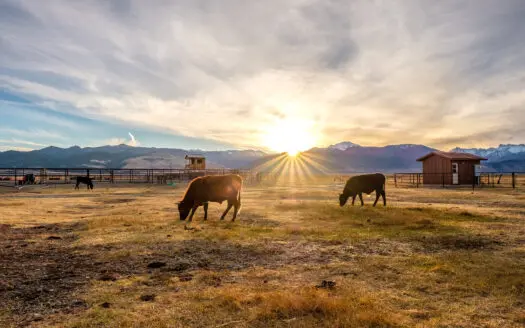7 Reasons Why Rural Living Is Good for Your Health | United Country Real Estate
7 Reasons Why Rural Living Is Good for Your Health
Do you ever dream of escaping the hustle and bustle of city life and embracing the tranquility of the countryside?
Well, it turns out that making the move to rural living might not only offer a quieter and slower-paced lifestyle, but it could also greatly benefit your health.
In recent years, there has been a growing fascination with rural living and its potential health advantages. As urban areas become more crowded and stressful, people are seeking refuge in the open spaces and peacefulness of rural communities.
Living in a rural area can have various positive effects on your health and overall well-being.
From cleaner air to a closer connection with nature, there are numerous reasons why rural living might just be the key to a healthier lifestyle.
In this article, we will explore seven compelling reasons why embracing rural life might be the best decision you make for your health.
Related: The Benefits of Ranch Living
1. Reduced Stress Levels and Improved Mental Well-being
Living in rural areas has numerous benefits, and one of the most significant is the positive impact it can have on your overall health.
Away from the hustle and bustle of city life, rural living offers a peaceful and tranquil environment that can contribute to reduced stress levels and improved mental well-being.
We will explore the benefits of reduced stress and enhanced mental well-being through rural living.
- Serene Natural Surroundings
Rural areas are blessed with picturesque landscapes, vast green spaces, and clean air. These serene natural surroundings have a calming effect on the mind and can help lower stress levels. Regular exposure to nature has been proven to boost mood, reduce anxiety, and ease tension, promoting mental well-being. - Limited Noise Pollution
Cities are notorious for their noise pollution with constant traffic, honking cars, and busy streets. Rural living, on the other hand, offers tranquility and peace without the constant background noise. The absence of noise pollution allows for increased focus, better concentration, and improved sleep quality—all vital for maintaining good mental health. - Community Connection
Rural communities are often tight-knit, fostering a strong sense of belonging and support. This close community connection translates into improved mental well-being by reducing feelings of isolation and loneliness. The support networks in rural areas can provide a safety net during challenging times and promote a sense of camaraderie and togetherness. - Reduced Stressors
Living in rural areas typically means a slower pace of life. There are fewer stressors associated with hectic schedules, overcrowded public transportation, and long commutes. The reduced pressure from daily life can lead to decreased levels of stress, allowing individuals to better manage their mental health and achieve a better work-life balance. - Outdoor Recreation Opportunities
Rural areas often offer abundant opportunities for outdoor recreation, from hiking trails to fishing spots and cycling routes. Engaging in physical activity in nature not only improves physical health but also has a significant positive impact on mental well-being. Exercise releases endorphins, which are known as the “feel-good” hormones, promoting a sense of happiness and reducing stress and anxiety. - Stronger Support for Mental Health Services
With the growing awareness and understanding of mental health, rural areas have made significant strides in providing access to mental health services.
Despite their remoteness, rural communities often have dedicated healthcare professionals and organizations that offer counseling, therapy, and support for those grappling with mental health issues. The presence of these services ensures that individuals have resources readily available to manage and improve their mental well-being.
- Enhanced Work-Life Balance
Urban living often comes with the pressure of long work hours and demanding commitments. Rural living promotes a better work-life balance by offering lower commute times, reduced work stress, and increased time for leisure activities. This balance between work and personal life encourages relaxation, rejuvenation, and an overall improved mental state.
2. Reduction in Air and Noise Pollution
Living in a rural area has numerous advantages, and one of the most significant is its positive impact on our health. While urban living exposes us to high levels of air and noise pollution, rural living provides a natural environment that can greatly improve our well-being.
Here’s how rural living helps reduce air and noise pollution, ultimately contributing to a healthier lifestyle.
Reduction in Air Pollution
One of the key advantages of rural living is the significant reduction in air pollution.
In urban areas, we are constantly exposed to harmful pollutants emitted by vehicles, factories, and other industrial activities. These pollutants, such as carbon monoxide, nitrogen dioxide, and particulate matter, have been linked to various respiratory diseases, cardiovascular problems, and even cancer.
In rural areas, the air is generally cleaner and of higher quality due to fewer cars on the roads, minimal industrial activities, and a greener environment.
The abundance of trees and plants in rural areas helps absorb carbon dioxide and release oxygen, improving air quality. Breathing in cleaner air can have substantial health benefits, including lower rates of respiratory illnesses, improved lung function, and a reduced risk of developing chronic conditions.
Reduction in Noise Pollution
Another advantage of rural living is the reduction in noise pollution. Urban areas are often filled with constant noise from traffic, construction sites, sirens, and crowded public spaces.
Prolonged exposure to high noise levels can lead to numerous health problems, including increased stress levels, sleep disturbances, hearing loss, and even cardiovascular issues.
In rural areas, the serene and peaceful environment allows us to escape from the constant noise of urban living.
The absence of heavy traffic and industrial activities results in a quieter environment, where the sounds of nature prevail. Studies have shown that exposure to natural sounds, such as birds chirping and leaves rustling, has a calming effect on our nervous system and can significantly reduce stress levels.
This peaceful atmosphere promotes better sleep quality, relaxation, and overall mental well-being.
3. Personal Autonomy and Privacy
In addition to scenic landscapes and a close-knit community, rural living provides various health advantages that can significantly improve one’s overall well-being.
One of these advantages is the opportunity to enjoy personal autonomy and privacy.
Peace and Solitude
One of the greatest advantages of living in a rural area is the tranquility and peace it offers. Away from the hustle and bustle of city life, rural areas provide a serene environment where individuals can find solace and escape from the constant noise and stress of urban living.
This peaceful atmosphere allows for uninterrupted relaxation and rejuvenation, which are essential for maintaining good mental and emotional health.
Increased Privacy
Privacy is often seen as a luxury in densely populated urban areas. Living in rural areas, however, offers the opportunity for increased privacy in various aspects of life.
Homes are often more spacious, with larger yards and greater distance between neighboring properties. This spatial separation not only provides physical privacy but also reduces noise pollution and minimizes the intrusion of others into our personal space.
The ability to enjoy privacy promotes a sense of security and enables individuals to feel more comfortable and at ease, contributing to their overall well-being.
4. Stronger Sense of Community
In contrast to the hustle and bustle of city life, rural living provides a unique opportunity to connect with neighbors, build meaningful relationships, and foster a supportive environment. These are the reasons why a stronger sense of community in rural areas can have a positive impact on your overall health and well-being.
Social Support System
One of the greatest benefits of living in a rural area is the tight-knit community that naturally forms. Rural residents typically know their neighbors well, creating a support network that is readily available during times of need.
Whether it is borrowing ingredients for a recipe or seeking emotional support during difficult times, having a network of people who genuinely care can greatly improve mental health and reduce feelings of isolation.
Increased Social Interaction
In rural areas, social interaction is often more frequent and genuine compared to urban settings. With fewer distractions and a slower pace of life, people in rural communities have more opportunities to engage in face-to-face conversations and develop meaningful connections.
Regular social interactions not only provide a sense of belonging but also contribute to improved cognitive function and reduced risk of mental health issues such as depression and anxiety.
Enhanced Sense of Belonging
Living in a close-knit community fosters a strong sense of belonging. In rural areas, individuals often experience a higher level of acceptance and inclusion, making it easier to develop a positive self-identity.
The bonds formed within these communities also lead to increased civic engagement, with residents actively participating in local events, community projects, and volunteering opportunities. This sense of purpose and belonging has been linked to improved overall well-being and a lower risk of chronic diseases.
Access to Resources and Support
Rural communities are known for their willingness to come together and support one another.
When faced with adversity, such as natural disasters or health challenges, rural residents often rally together, providing assistance and resources to those in need.
The strong support system in rural areas ensures that individuals have access to necessary services, including healthcare, transportation, and emergency assistance. This direct access to resources contributes to improved health outcomes and a higher quality of life.
5. Healthier Food
Living in a rural area offers numerous health benefits, starting with access to healthier food options. In rural communities, individuals have greater opportunities to grow their own fruits and vegetables or purchase them directly from local farmers.
The absence of large supermarkets and fast-food chains prevalent in urban areas often results in a diet that is less processed and contains fewer additives and preservatives.
This means that rural residents are more likely to consume fresh, nutritious food that is beneficial for their overall health and well-being.
6. Plenty of Exercises
Let’s explore why rural living promotes a more active lifestyle and how it contributes to better overall health.
- Abundance of Outdoor Spaces
One of the primary reasons why rural living encourages exercise is the abundance of outdoor spaces. Unlike congested urban areas, rural regions offer ample parks, trails, and open areas for recreational activities.
Whether it’s a hiking trail through the woods, cycling along quiet country roads, or simply taking a long walk amidst picturesque landscapes, rural dwellers have unparalleled access to natural environments that promote physical activity.
Related: Why Move to the Country?
- Reduced Sedentary Lifestyle
In rural areas, the emphasis is often on manual labor and physical work. From tending to farms and gardens to participating in community activities, rural residents tend to engage in more physical tasks throughout their daily routines.
This active lifestyle helps reduce the likelihood of leading a sedentary life, which is a common concern in urban areas where desk jobs and passive entertainment dominate.
- Opportunities for Agricultural Activities
Living in a rural setting allows individuals to engage in various agricultural activities, such as farming, gardening, and animal husbandry.
These activities not only provide a fulfilling hobby but also require physical exertion and constant movement. Working on a farm or tending to a garden involves tasks like digging, lifting, and bending, which are all beneficial for cardiovascular health and overall fitness.
- Limited Distractions and Alternative Options
In rural areas, the lack of fast-paced urban life and the abundance of natural surroundings reduce distractions and provide fewer alternative options for leisure and entertainment.
Unlike in cities, where people tend to rely on gyms and fitness studios for exercise, rural residents have nature and open spaces readily available. This naturally encourages them to integrate physical activities into their daily routines, leading to a healthier and more active lifestyle.
7. More Space to Enjoy
Are you tired of the hustle and bustle of city life? Do you long for wide-open spaces and a slower pace? If so, then rural living might be for you. Rural areas offer more space to enjoy and can provide a refreshing change of scenery from the crowded city streets.
Let’s explore the benefits of living in rural areas and how you can make the most of the space available to you.
- Escape the crowded city life
- Embrace nature and outdoor activities
- Create your ideal living space
- and engage in community life
If you are looking for more space to enjoy and a change of pace from city life, rural areas offer an enticing alternative. With their vast landscapes, connection to nature, and opportunities for personal and recreational expansion, rural living provides a refreshing change of scenery.
Embrace the slower pace and enjoy the space available to you in rural areas – you might just find a new sense of peace and fulfillment in the process.
Interested in Learning More About Rural Living?
Living in a rural area can offer a variety of benefits and a different way of life. If you’re interested in learning more about rural living, there are many resources available to help you get started.
From online articles and blogs to books and social media groups, you can find information about the advantages, challenges, and unique aspects of rural living.
Reaching out to people who currently live in rural areas or visit rural communities can provide firsthand insights and experiences.
Whether you’re considering a move to a rural area or simply want to learn more about this lifestyle, exploring the topic of rural living can be a fascinating and informative journey.
If you’re ready to take on that rural lifestyle, contact United Country Real Estate. We offer a variety of rural lands for sale, from country homes to ranch properties.






